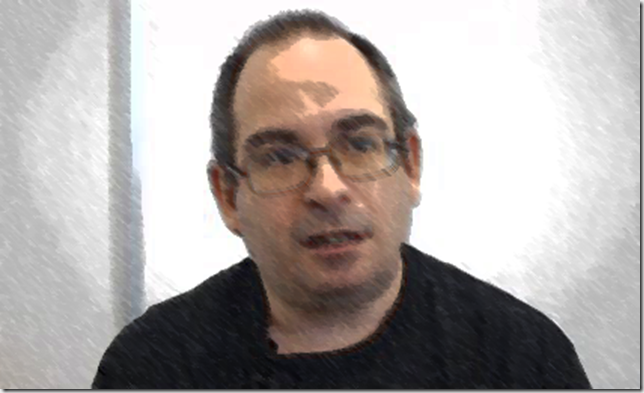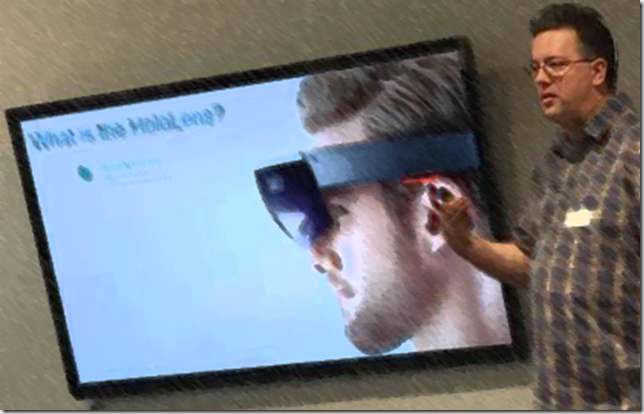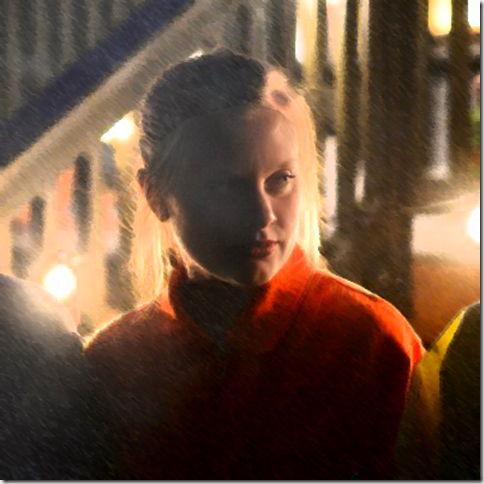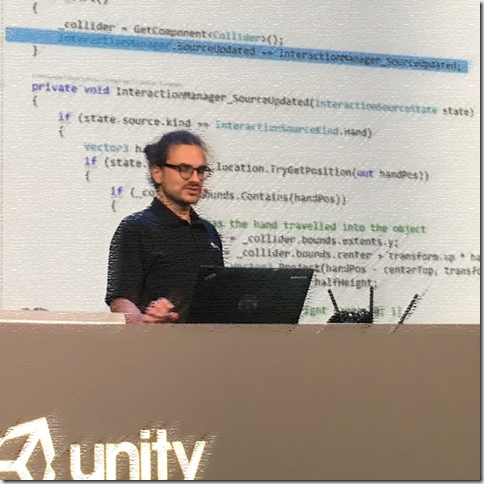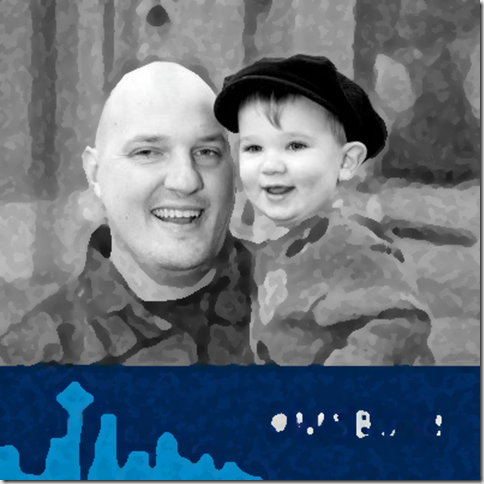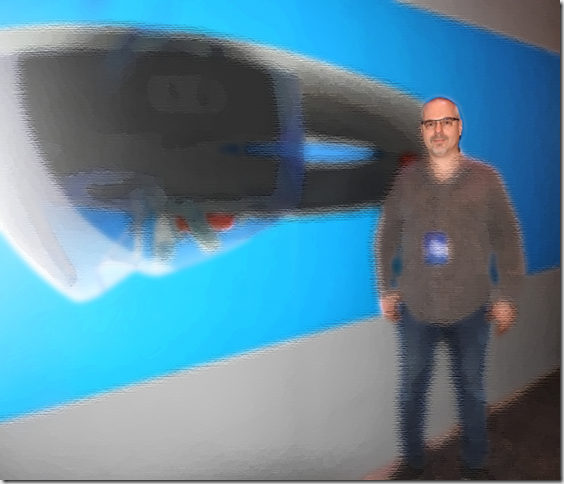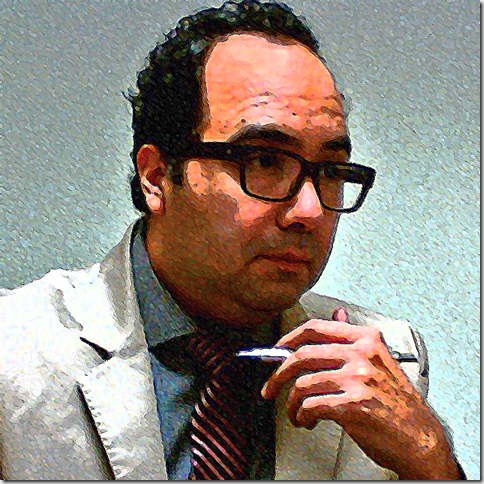
I first became aware of Rick because of his remarkable work as a Silverlight MVP with fluid dynamics algorithms. As the technology winds changed, he next became a Surface Table MVP and brought a designer’s perspective to Microsoft’s Natural User Interface initiatives. To everyone’s surprise, he left his comfortable position as Creative Director at Cynergy Systems a few years later to join Microsoft at a time when Microsoft wasn’t known to be particularly friendly toward designers. There he made a niche for himself as a liaison between Microsoft and the creative coding community.
I hadn’t realized how successful he was at this until I attended the Art & Code Conference in 2016 and had creative technologist after creative technologist come up and ask me if I knew Rick. He was applying his corporate resources and contacts toward helping digital artists complete projects such as virtual reality films, winning hearts and minds for Microsoft in the process. At the same time he was also using his talents to teach creative coding skills to the traditional Microsoft developer community in a popular series of Unity tutorials. In his mercurial way, he has now moved on from HoloLens and mixed reality devices to working with artificial intelligence algorithms, discovering new connections between AI and human creativity. If you ever get a chance to catch Rick speaking at a conference or—even better—glimpse him in the hotel lounge and have an opportunity to buy him a drink in exchange for stories, do it. He can spin a tale about technology that will make your head spin.
What movie has left the most lasting impression on you?
It would be a four way tie between 2001, Blade Runner, Amadeus and Dune. Growing up in the late 70’s and 80’s, all the Spielberg / Lucas fare is, by definition, highly influential so it’s not even fair to bring them up. But these four supplemental movies impressed upon me, at a very young age, topics of explosive consciousness, exponential human potential, and evolutionary humanity. Those are themes that continue to weave through all my personal and professional art and work.
What is the earliest video game you remember playing?
So, I’m of a particular age where some of my earliest memories were also the emergence of the very first arcade games. At a Marie Calendar’s down in San Diego, I remember playing “TANK!” on a cocktail table top, head to head with my older brother sitting across from me. The form factors were flawless, and this was late 70’s?! It had two joystick controllers, where you would have to push both forward to go forward, both backward to go backward, and then split to turn left or right. Even as a young child, this interface was amazing and natural and felt more ‘right’ then later video games that would impose a joystick / button interface. I didn’t have the vocabulary or training to explain why it felt so superior, I just knew that it did and the experience was better than anything else I had played. It rocked my world and showed me a different way to play arcade games. Subsequently, Space Invaders and Miss Pac-Man ended up devouring most of my hard earned quarters for the next several years.
Who is the person who has most influenced the way you think?
You have to realize in the 80’s, we were still deep in ‘Revenge of the Nerds’ social territory, where there was a strong demarcation between jocks, nerds, artists, etc. So as someone who felt drawn to both design and math, creativity and computation, my hero was obviously Leonardo Da Vinci. Before the internet, before finding communities of like-minded creatives, before finding others of my tribe and when the only access to external knowledge was physically being driven to a library, I would be this introverted, weird artist kid who spent all summer coding on his Timex Sinclair and devouring everything he could find on Leonardo Da Vinci. Between Paul Atreides (Dune), Valentine Michael Smith (Stranger in a Strange Land), and Leonardo Da Vinci, I felt I had my mentors and heroes as companions. People who wouldn’t force me to pick – artist or nerd? People who would encourage me, “why not both!”
When was the last time you changed your mind about something?
Diving into Deep Learning this past year and truly understanding where we are with A.I., the math involved, and where we’re going at an exponential rate has fundamentally changed me as a person at a deep, deep level. I have to explain to people that it has also changed me as an artist and creative, though it is still very hard for me to explain well in words. I’ll try. Up until last year, most of my persona was tied into this Renaissance style, “math behind the art, and the art behind the math” view of life. That’s kind of what I’m known for, and it requires a lot of mastery of color, composition, code, technique, etc. – high skill & high realism. This was great for creative coders as well, as creative coding tends to draw artists that are comfortable with mechanical systems. This was evident in the he type of art I would create (photorealistic and high resolution), the music I would play (Bach, Mozart, lots of math and fugues), etc. I never felt a kinship to Impressionism. It seemed sloppy and lacking. However, since this personal transformation around AI and deep learning, I have shifted from an affinity toward creative mechanical systems, to growing computationally organic systems, and this has changed my views and artistic sensibilities across the board. I’ve expanded as an artist and am absolutely obsessed now with Impressionists like Monet and musically, Debussy and Erik Satie. It is far closer to how these young A.I.s I’m growing process creativity, and this is taking up most of my mental and creative energies – exploring synthetic creativity and non-human, computational systems of creativity. I’m not sure if that answer even makes sense to anyone living outside my head. It will probably require a series of blog posts or YouTube videos to explain it properly, but I’m not there just yet. In short, I was never an impressionist before, but through A.I. and synthetic creativity, I’m finally starting to see what they were getting at and I completely love it. It’s how A.I. are becoming creative as well.
What’s a programming skill people assume you have but that you are terrible at?
Just about everything. I got my start decades ago from early Flash and design agency work, where the focus is on being experience optimized, not scale or production optimized. So I learned to code the way I sketch, a ton of spaghetti code with magic numbers all over the place. I code very personally and iteratively. As a creative process, I tended to work in isolation (before this year’s shift into A.I. collaboration). So many times, production engineers approach me thinking I naturally practice MVC or MVVM, or speak to me as someone who regularly works in SCRUM, etc., and we just come from two different planets. I think I can fuse and prototype very quickly design and emerging technology, plus being able to throw obscure math at the problem always helps, but I am 100% an exploratory and expressive engineer, not a production engineer at all. I think these are two different cultures, and I’m totally ok with that, but a lot of production engineers don’t seem to recognize exploratory engineering as its own discipline and culture.
What inspires you to learn?
Biological systems inspire me. At a formative age, and in my more esoteric readings, I came across this quote from a 19th century author Alexander Hislop that really left a mark on my young self:
“There is this great difference between the works of men and the works of God, that the same minute and searching investigation, which displays the defects and imperfections of the one, brings out also the beauties of the other. If the most finely polished needle on which the art of man has been expended be subjected to a microscope, many inequalities, much roughness and clumsiness, will be seen. But if the microscope be brought to bear on the flowers of the field, no such result appears. Instead of their beauty diminishing, new beauties and still more delicate, that have escaped the naked eye, are forthwith discovered.”
This nature of biological systems, where majesty and intelligence are fractally nested upon themselves, from the microscopic to the macroscopic, fill me with wonder every day. I feel it is our duty as a species to throw ourselves into the endless tapestry, learn from it, imitate it and defend it. Not continuously learning and sharing has never been a lifestyle option. That’s what drives me and inspires me.
What do you need to believe in order to get through the day?
I believe in the beginning of our anthropic Universe, there was math. This math was manifest in the ratios of the four fundamental forces, the up and down calibrations of the quarks, and the bosons and electrons. The perfect tuning of this math birthed Physics. Physics, in turn, birthed Chemistry and Chemistry birthed Biology. Biology birthed diversity. I need to believe as conscious entities, we have a birthright, duty and responsibility to explore, discover and expand this endless progression. That gets me up and through the day.
What’s a view that you hold but can’t defend?
That everything I just said didn’t happen by chance.
What will the future killer Mixed Reality app do?
I don’t think it is a killer app, to be honest. I think it will be a killer form factor. We need it on our glasses, or on contacts. The form factor has to disappear, or get significantly smaller than what we currently have. Once the interface is transparent, than assuming it has fast bandwidth to cloud based A.I., decent volumetric awareness of one’s surroundings and solid, stereoscopic rendering – all the parts will be in place. Anything before that is still baby steps to get to that, so that’s what I’m both pushing and waiting for.
What book have you recommended the most?
Recently, I’ve been recommending a great new novel that came out this year called Void Star. It is one of the very first books I’ve read that tackles the subject of A.I.s from a post “Deep Learning” awareness and perspective. As such, I think it is going to be the Neuromancer or Snow Crash of this decade. As the saying goes, science fiction writes about the present day through a veil of technology and speculation. It tells us much more about today’s hopes and dreams then about future worlds. As such, most A.I. in science fiction have usually been written as stand-ins for social issues of the day, from Metropolis’ Maria to Hal 9000 to the T-800 to Jarvis. They all slavishly follow the “Turing Test” model of self-obsession with our own humanity. However, Void Star presents computational systems that are the closest I’ve seen to matching the vector of innovation now underway with real systems of artificial intelligence coming online. The strength of true A.I. these days is that they are fundamentally NOT human in their calculations, and so issues of humanity and self-awareness don’t even apply with truly alien computational systems of thought. Plus, it’s just such a great weaving of stories and characters. I loved it and recommend it broadly to anyone working in A.I. or mixed reality.

